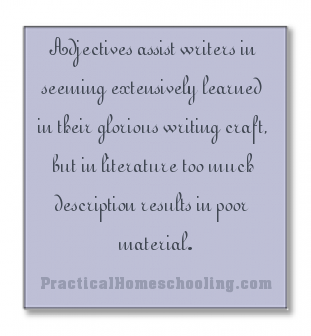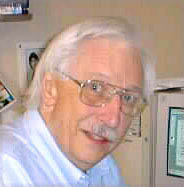"Beware The Awful Curse of Horrible Overwriting," She Pontificated
By David Marks
Printed in Practical Homeschooling #53, 2003.
 How to avoid the dread disease of overwriting.
How to avoid the dread disease of overwriting.

|
 |
 It's unfortunate but some children have the idea that the more ornate they can be with their writing, the better writing it would be. They may have received this idea from their parents when they were told that the adjectives they were using in a piece of writing allowed the parent to "see" the thing described.
It's unfortunate but some children have the idea that the more ornate they can be with their writing, the better writing it would be. They may have received this idea from their parents when they were told that the adjectives they were using in a piece of writing allowed the parent to "see" the thing described.
There are writing programs available to homeschooling parents which advise having the children use lots of adjectives. Some have children list adjectives and then select two or three among them for inclusion in a sentence. There are programs that instruct young writers never to use simple verbs. They are not to write that Janet walked to the door, but to write that Janet sauntered or ran excitedly or skipped with enthusiasm, or raced or sashayed to the door. This would certainly give a young writer the idea that the more synonyms he uses, the better his writing will be.
In reality, this kind of instruction produces what is called overwriting. Overwriting blatantly informs the reader of every sight, sound, smell, emotion, etc. in excruciating detail. The reader is never left to infer the character's state of mind or appearance via behavior or dialogue, but told it all straight out with megadoses of adjectives, adverbs, and odd choices of verbs.
One typical example of overwriting: telling students that they should never use the word said when they write conversation. These kinds of instructions produce writing that reads this way:
Janet, her pale lips trembling with anxiety, her brow wrinkled with worry, and her fingers fluttering and grasping each other with insecurity, screeched, "What did you say?"
Bill responded with remorse, "The parakeet is dead."
"How did she die?" queried Janet tremulously.
"In the vacuum cleaner you left running," reported Bill with alacrity.
Of course, you recognize how awful that is. How much better said if done this way:
Janet looked up and said, "What?'
"The parakeet's dead," said Bill.
"Oh no! How did she die?"
"You left the vacuum cleaner running."
Most things can and should be said simply and your children should be told this. There will be plenty of time for them to experiment with styles of writing when they have read enough to recognize the difference between using lots of words and using a few words well. To help you explain this to your children, you might read to them some modern writers who don't write romance novels. Try C. S. Lewis, Ernest Hemingway and/or John Gardner. Your children will recognize that important and significant things can be said with a few well-chosen words.
Nipping Overwriting in the Bud
To encourage your children in writing simply, put away the thesaurus and ask your children to use words that they are familiar with and that are in their speaking vocabularies. This should eliminate from their choices those expressions that ring bells in any reader's mind. When I read student papers that contain words such as alas or expressions such as "to no avail," I know I'm dealing with a child who has not been guided in reading matter or one who had a critic who has not understood writing.
If you recognize your situation here, don't despair; this is very common even with teachers in schools who have been trained to know better!
If your children want to use what I call flowery writing, you might have a conversation with them about the function of an author. You should explain that you're not talking about romantic or Victorian writing. That is a special case and your children shouldn't be expected to write that way until they are very accomplished at expressing ideas simply. You should explain that an author's primary job is to impart information and that an individual style used in that process can and should be developed when the writer has had a great deal of reading experience. Any well designed writing program will lead young writers to explorations of methods of creating various emotional effects in description, but this should not happen until the child has developed the ability to write with precision and clarity.
How to Teach Simple Writing
The following contrived conversation between a home schooling mother and an inexperienced writer should help me make this clear.
Mom: Jan, I read your description of the people standing on the beach watching the sun set, and I want to talk to you about it.
Janet: I knew you'd like it.
Mom: Why is that?
Janet: Because I used so many descriptive words that you could see the sun setting.
Mom: That's what I want to discuss with you. I've been reading an article about writing and I may have misled you about using adjectives.
Janet: How?
Mom: It may be that it would be better writing if you said what you have to say simply. If you don't use all the descriptive words you can.
Janet: But you said...
Mom: Yes, but I'm not a writer and I haven't been trained to teach writing and now I want you to try something new.
Janet: I was just getting the feel for description. I like the sound of the sunset. Here, let me read it to you and maybe you'll like it more:
The rose-red and fiery sun slowly settled into the dark and distant waves like some great, billowing sailing ship sinking beyond the horizon. It cast its pink and violet flags along the tops of the clouds where they waved majestically but briefly before this ship of light slid beneath the subtle waves of darkness and cast us, standing there on the beach, into night.
Mom: You were writing just the way I may have encouraged you to in the past, but now I want you to try to say the same thing in as simple a way as you can.
Janet: OK, I've written it again. I don't like it nearly as much, but here it is.
While the sun set, we remained on the beach gazing at the darkening sky.
Mom: You're right, that is a lot different. I'm not sure that I like it as much either, but I think that for now that is the way I would like you to write. Anyway, try it this way for a while, and, when you've read some of the books by modern authors I've picked out, you can experiment a bit with style.
The point of all this is that it is better for your children to concentrate on the transmission of ideas and information rather than trying to impress their readers with how many fancy words they can use. Save those fancy metaphors and adjectives for your poetry classes!